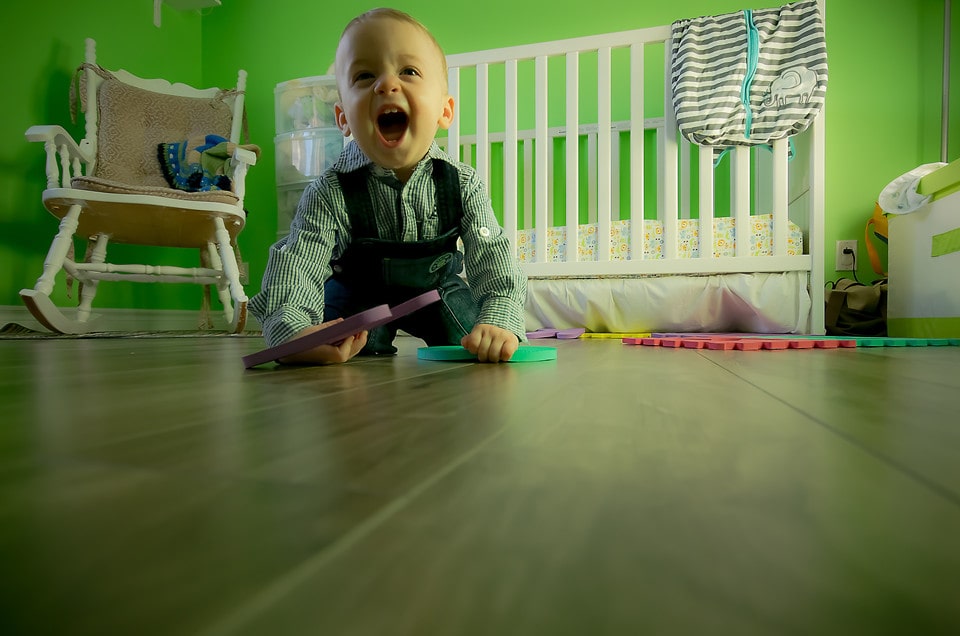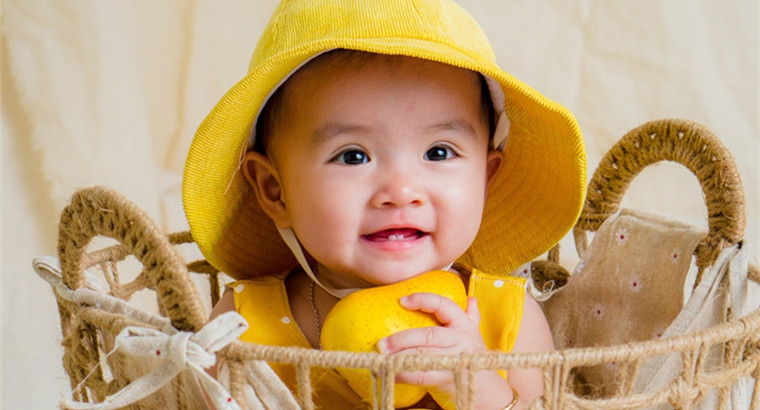Did you notice your baby or toddler grinding their teeth often? Does it happen at night, when they’re asleep, and do they also clench their jaw a lot?
Teeth grinding is quite common in children. If you want to know why your baby grinds its teeth and why (and how) you should prevent it, then you’ve come to the right place.
What Is Teeth Grinding?

Over the course of the day, a person might grind, clench, gnash, or gnaw their teeth involuntarily. This condition is called bruxism.
There’s a reason why we stressed the term “person” there. While this article will specifically focus on bruxism in babies and toddlers, people of all ages can have this condition. In fact, your own child might have it until it turns 6. What’s more, as many as 30% of kids around the globe actually grind their teeth, voluntarily or otherwise.
Depending on when you grind your teeth, you might either have regular or sleep bruxism. Sleep bruxism in adults usually comes coupled with other sleep-related conditions. In other words, if you grind your teeth while sleeping, you might also have sleep deprivation, insomnia, or sleep apnea. Alternatively, you might just be snoring a lot.
Why Does My Baby Grind Its Teeth? 6 Reasons

So, what’s the deal with babies and bruxism? Well, they usually start to grind as early as 6 months old, or when they start getting their first teeth. Overall, a toddler will grind its teeth during the night, when it’s asleep. There can be a wide variety of reasons behind this behavior, so let’s go over the most common ones.
1. Curiosity
Sometimes, the simplest answers are the correct ones. Babies, and especially young toddlers, are incredibly curious about everything. During this time, they learn about the world in various ways, both direct and indirect. And oftentimes, they will fiddle around with different parts of their body to figure out how they work.
A toddler might do any of the following when it comes to their mouth and teeth:
• Touch the lips or the gums several times a day
• Gnaw on its fingers
• Blow a raspberry with its lips in order to make a funny noise
• Bite its lower lip
• Bite anything it finds
• Pick at the growing tooth with its fingers.
Grinding its teeth is really no different from any of the acts listed above. Your baby simply found a new way of amusing itself using its body. Once it gets tired of it, the baby will naturally stop grinding its teeth and it’s really only a matter of time.
2. Stress
Stressful situations can have a negative effect on a child, no matter its age. For example, if there are people living in your home who argue a lot, that negativity can be felt by your little one. As a result, it can start crying a lot or throwing tantrums, or really doing anything just to make the stress stop.
With that in mind, bruxism can be an involuntary reaction to stress. Your toddler might not do it during the day, of course. But if you hear grinding at night, especially after a major fight in your home, you can definitely classify it as the baby’s reaction to the negativity.
Of course, stress doesn’t only have to come from adults arguing. Anything that can make the baby feel uncomfortable can ultimately result in teeth grinding. Some of those stressful stimuli include drastic changes in the weather, a mild illness, loud noises from outside, physical injury, or even a lack of proper attention.
3. Medical Conditions
Sometimes, children with various medical conditions might show symptoms of bruxism. By far, the most common condition that leads to teeth grinding is cerebral palsy. Children afflicted with cerebral palsy usually tend to grind their teeth well after they reach school age.
Interestingly, there are times when the condition itself will not cause bruxism, but it will occur during treatment. Certain types of medication negatively affect the child while it’s healing, to the point where it will clench and gnash its teeth during sleep. That’s especially true with toddlers who have to receive potent meds for rare conditions.
However, there is a silver lining to this particular reason behind bruxism. Once the child is off its medication, the teeth grinding will slowly go away and it can sleep again without making any noise.
4. Dental Problems
Though we still don’t have enough data to prove or disprove this point, there are strong arguments out there that dental issues with toddlers might cause bruxism. For example, if your toddler’s teeth start growing and they are misaligned, the little one is highly likely to grind them in its sleep, unaware.
The same can happen if there’s an issue with a tooth or two while they’re growing, and sometimes the toddler might grind even after losing a tooth during its growth.
Another potential reason behind teeth grinding could be breathing through the mouth. Toddlers, especially those who are sick with the cold or the flu, breathe through the mouth more frequently than healthy ones. This habit might actually increase the chances of the toddler grinding its teeth while it’s asleep.
5. Pain Relief
As new teeth grow, they can cause the baby a lot of pain. Sometimes it spreads to the jaw, the face, and even the entire head itself, though it mostly stays in the dental area. Since our toddlers feel that pain quite often while their teeth grow, they will grind them as a reflex, a way of trying to calm themselves down and not think about the pain. In this respect, they are incredibly similar to adult humans, who also grit their teeth when in severe pain.
Paradoxically, babies will even grind their teeth when they have an obvious toothache. As stated earlier, they do this subconsciously, as a way of relieving pain and stress.
6. Second-Hand Smoke
This might come as a surprise to some, but babies, toddlers, and even young children all grind their teeth as a reaction to second-hand smoke. And once again, it is largely involuntary and happens without the child being conscious of it.
It’s a sad fact, but millions of parents across the globe smoke. Those numbers might be down in the past decade and a half, but they are still alarming nonetheless. Not only will second-hand smoke cause bruxism and other potential health hazards, but it will all but guarantee that the child itself will grow up to become a smoker.
Other Reasons
Older toddlers might use teeth grinding as a defense mechanism, especially after having a bad dream. Night terrors and other conditions related to poor sleep can just as easily lead to this kind of behavior.
Furthermore, we should also take genetics into consideration, as well as the behavioral patterns of the parents. As stated earlier, children of smokers will inevitably end up smoking themselves. The same goes for bruxism; if your family has a history of grinding teeth, you will likely inherit that trait. What’s more, you don’t even have to be around your parents to do so, as these patterns are ingrained on a genetic level.
Finally, your toddler might simply grind its teeth out of pure boredom. If you don’t give it enough attention or if it’s left alone often, it will do anything to occupy its time. And even if it knows that teeth grinding is wrong or painful, it will do it all the same just to keep itself amused.
What Are the Symptoms of Bruxism?

Obviously, the most obvious symptom of bruxism is the constant grinding. You might hear it as a light scraping noise at night or during the baby’s naptime. Alternatively, you might see the baby move its jaws in the same motion as you would when grinding, i.e., the lower jaw would go left-to-right and back parallel to the upper jaw.
However, there are also other symptoms that might indicate bruxism. For instance, you might see its gums swell up for no apparent reason. Alternatively, if you check its teeth, you can spot signs of damage, such as fractures, gum deterioration, and even teeth wearing out.
Tooth sensitivity is also a major giveaway of bruxism. When you feed your baby formula, breast milk, or solid food that’s a bit hotter or colder than normal, it might react by crying loudly or refusing to eat. That’s because all of the grinding is making both its teeth and its gums sensitive. As such, a strong stimulus such as heat or cold will cause the baby’s nerves to react immediately.
Another, albeit less common symptom of bruxism involves jaw pain and headaches. By moving its jaw a lot, the baby will put a lot of pressure on it, making it ache. In some extreme cases, the pain will be so strong that it will affect the baby’s tiny cranium.
What Problems Can Teeth Grinding Cause?

Usually, teeth grinding is merely a phase in the baby’s life and it doesn’t cause too many problems. But if it occurs often, it can have lots of negative effects. Said effects can either be short-term or long-term.
Short-Term Problems
The immediate issues you will spot with your baby or toddler will include:
• Headaches
• Muscle pain
• Painful chewing
• Tooth sensitivity.
We’ve already covered tooth sensitivity and painful chewing, as the two are related. Excessive grinding will wear down the teeth to the point where they become too sensitive to hot or cold food and drinks. Furthermore, with the jaw under so much pressure, your child might even have problems opening and closing its mouth while eating.
Muscle pain is a bit broad. The closest muscles that teeth grinding can affect are the ones around the jaw, as well as facial muscles and even some neck muscles. Any continuous stress in these areas can lead to chronic pain. And chronic pain in toddlers will result in lots of crying, problems during feeding, sleeping, and in extreme cases, even movement.
Headaches are somewhat rare, but it’s not unheard of for a toddler’s head to be in severe pain due to excessive teeth grinding. Alternatively, the pain might just come from stress caused by the pain in the jaw, the gums, or the facial muscles. In other words, a headache could be a secondary symptom related to something more concrete.
Long-Term Problems
Long-term problems of prolonged bruxism include:
• Flattened teeth
• Chipped teeth
• Temporomandibular joint disorder or TMJD.
Let’s go over them one by one. Human teeth are naturally a bit jagged or serrated, especially the incisors. If your little one continuously grinds its teeth, it can flatten them partially or completely.
The risk of chipping a tooth due to bruxism is also high. By continuing to grind them, your baby will wear down its teeth’s enamel to the point where each tooth becomes frail and exposed. Without the proper enamel protecting it, the tooth will eventually crack.
By far the most extreme long-term problem is the TMJD. This disorder causes stiffness and piercing jaw pain. A child that develops TMJD will have a hard time opening and closing its mouth, moving its jaw, or chewing.
How to Stop My Baby From Grinding Its Teeth

Luckily, bruxism is largely temporary. The vast majority of kids stop grinding their teeth before they start elementary school, and the extreme cases are incredibly rare. Of course, there are different ways in which you can help your little one to stop wearing its teeth down. It all depends on how old your child is and how serious the problem might be.
Tips on Stopping Bruxism: Babies
With babies, bruxism can be relatively easily stopped. All you need is a proper teether. More often than not, a baby will feel lots of pain with the new teeth growing and will want something to chew on to relieve the discomfort.
So, what kind of teether should you get? Well, try one of these three options:
• Cold rubber teethers
• Soft rubber teethers
• Silicone teething necklaces.
Cold rubber will actually help reduce any swelling your little one might have on the gums. Furthermore, it will feel good against the forming teeth. The same goes for regular rubber, provided that it’s soft and squishy enough. Hard rubber might cause even more pain, but if the rubber is too soft, the child might actually damage it.
Silicone works roughly the same as rubber here. It has a similar texture and it can endure chewing for long periods of time. You can get a regular silicone toy, but necklaces are more fun and accessible.
Tips on Stopping Bruxism: Toddlers
Toddlers, unlike babies, tend to understand a lot that’s going on around them. So, when they grind their teeth, they might do so out of stress, fear, panic, or boredom. As such, you can apply several strategies to get them to stop grinding and gnashing:
• Reduce screen time right before your toddler needs to go to bed
• Read your little one a bedtime story
• Brush its teeth regularly
• Don’t feed it food or infant formula that’s too hot or cold
• Dim the lights an hour or so before bedtime approaches
• Use a white noise machine to get it to sleep (alternatively, play some white noise on your smart device and dim the lights on it as much as possible).
Treating Bruxism: When to See a Doctor
There are certain types of medication that can help your little one stop grinding its teeth. For example, some basic stress relievers could do the trick, provided they’re the right dosage for their age. However, don’t rush to give your child any medication without consulting a dentist or a pediatrician.
Most of the time, the grinding will go away on its own, but if you spot serious injuries to the teeth, gums, or skin of your child, you’ll want to see a professional. The same goes for excessive headaches, earaches, restricted jaw movement, and an increase in crying or irritability.










